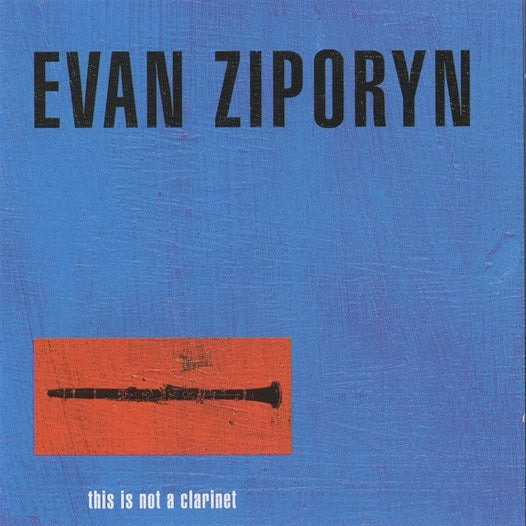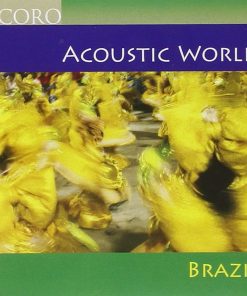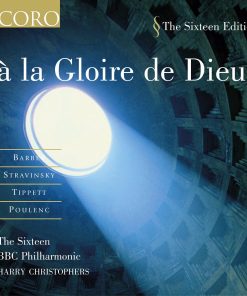Evan Ziporyn: this is not a clarinet CANTALOUPE
$ 2,99 $ 1,79

“this is not a clarinet is a recording, a record of some recent thoughts about the clarinet, as an instrument, as a cultural object, as an extension of myself, physically and metaphysically. As the title Partial Truths implies, its only claims to objectivity are incomplete and full of overtones; as Impersonations indicates, its subjectivity is both internal and artificial. The starting point for all the works are also double-edged: musically, they start with acoustics, with the idea that musical substance resides in the entire overtone spectrum (the ‘partials’) rather than simply in the fundamentals; culturally, that the clarinet is an oral, folk instrument, whose function has always been to mediate between western and non-western music, between classical and non-classical idioms.
“Thus new works by contemporary American composers (Lang, Tenzer) which spring from vernacular inspirations (James Brown, Croatian vocal music, etc.) are placed next to re-workings of traditional musics from Japan, Bali, and East Africa (Impersonations). And Partial Truths tries to pull it all together, at least provisionally.
“The pieces all mediate between worlds, thereby creating unique compositional languages: David Lang describes his piece as trying to ‘find the place where James Brown meets J.S. Bach’ – and of course the result sounds only like Lang. Each of Tenzer’s pieces are fantasies built around far-flung, overlooked musical traditions…Krk-y is based on duo singing on an island near Croatia; Biak-words is based on the interlocking ornamental patterns of Bali; Bouvet Fanfare is, well, based on a piece of mine, but puts it through very un-Evan-like paces…
“As for the impersonations, they are simply less abstracted versions: I transcribed these works carefully, and found extended playing techniques-microtonal fingerings, multiphonics, circular breathing, etc-to replicate them as closely as possible. Of course, the result, as with Lang and Tenzer, is not a replication but a newly discovered facet of the instrument and a path to new directions in my future work.
“In my twenties I wrote clarinet music to express myself; in my thirties I wrote no clarinet music at all. Now I’m 41, I try to let the self-expression and the self-abnegation take care of themselves. Rather, I’m trying to look into and through the fundamentals, staring at and past the boundaries, trying to see what’s there, what’s on the other side, and what the connection might be. And trying to keep you posted as I go.” – Evan Ziporyn
About Partial Truths
“Partial Truths is my longest work for solo bass clarinet to date, part of my ongoing efforts to reflect on my own relationship to my instrument, and thus to music making in general. The title is deliberately ambiguous, but refers at least in part to acoustical ‘partials’ (overtones), in that the musical substance resides in the entire overtone spectrum rather than simply in the fundamentals. Melodies and harmonies rise out of the physical reality of the instrument, imply and insinuate, then merge back into the ether. It is dedicated to Arnold Dreyblatt.” – Evan Ziporyn
About Four Impersonations: Honshirabe, Pengrangrang Gde, Thum Nyatiti, Bindu Semara
“In Balinese trance, as in many similar traditions throughout the world, subjects are inhabited by specific people or entities who speak through them. Their voice remains their own, but the words they speak are foreign to them, often in ancient or foreign languages they themselves do not understand. In these pieces the voices of three different cultures – Japanese shakuhachi (Honshirabe), Balinese gamelan (Pengrangrang Gde and Bindu Semara), and East African nyatiti (Thum Nyatiti) – speak through the clarinet. As a rational westerner, I’ve transcribed and translated, found ways to play them, but as a trance subject-wannabe I leave the interpretation to others.” – Evan Ziporyn
About Three Island Duets
“Three Island Duets was written in 1992 in response to a request from Evan. The two of us have gone on many musical excursions together over the years, some by actually traveling, and some by listening at home. Each of the three pieces in this set reflect those experiences in some way. Krk-y refers to the dissonant two-part singing on the island of Krk, located in the Adriatic sea off the coast of the former Yugoslavia. Bartok expressed eloquent amazement at this music when he encountered it, rather late in his life. Songs there are sometimes also rendered on the sopile, a clarinet-like instrument. Biakwords takes on the hocket techniques (kotekan) of Balinese music. Biak is a remote Indonesian island with a decrepit World War II airstrip recently repaved to accomodate DC-10 landings. Until recently it served as a fueling stop for Indonesian Garuda jets making the tourist run from Los Angeles to Denpasar, Bali. The transit lounge there is an interesting place to contemplate cultures in collision. Bouvet Fanfare is imaginary music of Bouvet, an island isolated in the southern Atlantic Ocean. Evan and I guess that it must be one of the most remote places on earth, thousands of miles from either Capetown or Tierra del Fuego, with nothing anywhere in between. Neither of us have ever been to Bouvet, but a friend of ours went once, and this is what she saw there.” – Michael Tenzer
About Press Release
“I wrote Press Release in 1991 for Evan Ziporyn. When you compose for one person, you can’t get all the colors that you’d have with an ensemble or orchestra, so you have to imagine some sort of interesting problem. I wanted to do something that was really rhythmic. The original idea behind this piece was that of a high melody alternating with a low bass line, so that you get a high pop and a low pop switching back and forth as fast as possible, and these two worlds coexist. I wanted the upper melody to be recognizable and the bottom bass line to be recognizable, to be a real bass line, a driving funk thing. In classical music, the bass is only there to support the melody, which is where the action is. But the bass line is the place where funk music really shines. Who has the best bass lines in the business? I am a big James Brown fan, and, I thought, if you want a bass line, you got to go to James. So I made the key changes sound like James Brown. Because of the way the bass clarinet works, I thought you’d have to press the keys down to make all the low notes, and you’d release the keys to make the high notes….Press Release. I was really proud of myself because I thought I had made this funny joke, and then of course Evan said, ‘You know, a lot of those high notes you play with all your fingers down, and a lot of those low notes you play with all your fingers up.’ But I didn’t think it was worth it to change the title.” – David Lang

1.
Partial Truths 16:17
2.
Four Impersonations: Honshirabe 04:03
3.
Four Impersonations: Pengrangrang Gede 05:26
4.
Four Impersonations: Thum Nyatiti 02:23
5.
Four Impersonations: Bindu Semara 05:22
6.
Michael Tenzer: Kuk-Y 02:39
7.
Michael Tenzer: Biak Words 03:03
8.
Michael Tenzer: Bouvet Fanfare 04:15
9.
David Lang: press release 09:20
Fast Shipping and Professional Packing
Due to our longstanding partnership with UPS FedEx DHL and other leading international carriers, we are able to provide a range of shipping options. Our warehouse staff are highly trained to pack your goods exactly according to the specifications that we supply. Your goods will undergo a thorough examination and will be safely packaged prior to being sent out. Everyday we deliver hundreds of packages to our customers from all over the world. This is an indication of our dedication to being the largest online retailer worldwide. Warehouses and distribution centers can be located in Europe as well as the USA.
Orders with more than 1 item are assigned processing periods for each item.
Before shipment, all ordered products will be thoroughly inspected. Today, most orders will be shipped within 48 hours. The estimated delivery time is between 3-7 days.
Returns
The stock is constantly changing. It's not entirely managed by us since we are involved with multiple parties such as the factory and our storage. The actual stock can fluctuate at any time. Please understand it may happen that your order will be out of stock when the order is placed.
Our policy is valid for 30 days. If you haven't received your product within 30 days, we're not able to issue either a return or exchange.
You are able to return a product if it is unused and in the same condition when you received it. It must also still remain in the original packaging.
Related products
MUSIC CD
MUSIC CD
MUSIC CD






















































